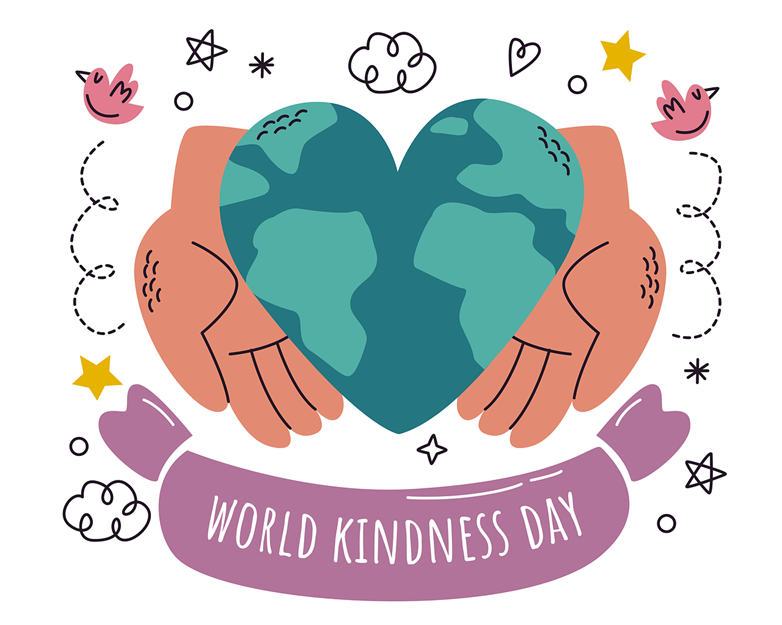February 17 is Random Acts of Kindness Day. Here’s what the Bible says about random acts of kindness and seven examples from Scripture.

Where Did Random Acts of Kindness Come From?
The phrase “random acts of kindness” (abbreviated as RAK) has taken its place in the common language of our culture. But where did it come from? Susan Jeffers writes:
According to Wikipedia, the phrase came from writer Anne Herbert, who scribbled it down on a restaurant placemat in 1982. She came up with it as a counter to the phrase “random acts of violence and senseless acts of cruelty” which had become a go-to summary of the rise in violent crime during the 1970s. The phrase turned out to be so popular that she became a best-selling author and there was hardly a car in the mid-1990s that didn’t have a bumper sticker with the phrase on it.
Random Acts of Kindness Day
Inspired by this phrase, Random Acts of Kindness Day was established to encourage people toward senseless love and careless compassion. The Random Acts of Kindness Foundation suggests an entire week, from February 11-17, for such activities as:
- Donating a book to a library
- Visiting senior homes to deliver a kind surprise
- Being a friend to a lonely neighbor
- Buying second-hand instead of new products
- Cooking a meal for someone who is struggling
- Complimenting with reckless abandon
- Donating blood
- Leaving snacks and refreshments for delivery drivers
You can use your own creativity to come up with a list, or you can check out their website for more ideas.
Acts of Kindness in the Bible
The Bible also has stories that encourage random acts of kindness. From the Hebrew Scriptures to the New Testament, biblical narratives exhibit ways for believers to share blessings with others. Here are just seven examples:
1. The First Random Act of Kindness
In the book of Genesis, when Cain commits the first murder, he expects God to execute the first death penalty. Instead, God places a mark upon Cain to prevent people from killing him. God provides a new home, and a wife for Cain so he can begin a new life. By performing the first random act of kindness, God demonstrates the way of kindness to a hurting humanity.
2. Invite the Neighbors
The story of the first Passover exemplifies kindness shown to neighbors. When the Death Angel visits Egypt, God instructs each Hebrew family to protect their home by sprinkling lamb’s blood on their doorposts. Then, the family celebrates their salvation with a feast of lamb. Exodus 12:4 says, “If a household is too small for a whole lamb, it shall join its closest neighbor in obtaining one; the lamb shall be divided in proportion to the number of people who eat of it.” In this way, not a single household gets left out of the Passover, and everyone shares the same salvation, regardless of their means.
3. Kindness Toward the Poor
In the book of Leviticus, Hebrew law mandates acts of kindness toward the poor. Farmers are told, “When you reap the harvest of your land, you shall not reap to the very edges of your field or gather the gleanings of your harvest; you shall leave them for the poor and for the alien: I am the Lord your God.” Further, the Mosaic law makes provisions for people to offer alms to the poor.
4. A Family Tradition of Kindness
The story of Ruth depicts a family history of kindness. When Naomi’s three sons and husband die, leaving the matriarch and her daughters-in-law all widowed, we witness the kindness of Ruth, who swears loyalty to her mother-in-law, come what may. Next, we see the kindness of the farmer Boaz, who takes compassion on Ruth even though she is a foreigner. Following the Levitical law, he does not plow the edges of his field—and even tells his servants to intentionally drop grain as they harvest—so that Ruth can glean all she needs. Finally, we watch the kindness of Naomi, who encourages her daughter-in-law to marry Boaz rather than remain a widow. This family must have had quite a tradition of random acts of kindness. Their beliefs about kindness made their way through the generations to Ruth’s descendant, Jesus.
5. True Worship Means Kindness
The prophet Isaiah emphasizes that God despises religiosity and oppresses the poor. Rather, true worship involves taking care of the suffering. Isaiah 58:6-10 says:
Is not this the fast that I choose:
to loose the bonds of injustice,
to undo the straps of the yoke,
to let the oppressed go free,
and to break every yoke?Is it not to share your bread with the hungry
and bring the homeless poor into your house;
when you see the naked, to cover them
and not to hide yourself from your own kin?
Then your light shall break forth like the dawn,
and your healing shall spring up quickly;
your vindicator shall go before you;
the glory of the Lord shall be your rear guard.
Then you shall call, and the Lord will answer;
you shall cry for help, and he will say, “Here I am.”If you remove the yoke from among you,
the pointing of the finger, the speaking of evil,
if you offer your food to the hungry
and satisfy the needs of the afflicted,
then your light shall rise in the darkness
and your gloom be like the noonday.
6. The Good Samaritan
The story of the Good Samaritan is so synonymous with random acts of kindness that people who have never read the Bible know the term. In Luke 10, Jesus tells the tale of a Jewish man who falls prey to highway bandits. A priest and a holy Levite, on their way to their sacred duties, pass by the bleeding man on the side of the road. But a despised Samaritan stops to offer a random act of kindness. Overcoming the prejudice that he has suffered from his Jewish neighbors, this Samaritan shows himself more of a neighbor than the holy men who don’t want to soil their robes. He binds the man’s wounds, puts him on the Samaritan’s own donkey, and takes him to an inn where he pays for ample recovery time in a private room. Jesus’ story illustrates that being a neighbor isn’t about simply living near someone. It’s about sharing love and kindness with those in need.
7. Jesus: Our Ultimate Example of Kindness
In the Gospels, everywhere Jesus goes, he performs random acts of kindness toward those he encounters. In Acts 10:38, the apostle Peter talks about “how God anointed Jesus of Nazareth with the Holy Spirit and with power; how he went about doing good and healing all who were oppressed by the devil, for God was with him.” No one is exempt from Jesus’s compassion. He heals the sick—especially those who were stigmatized as sinners or outcasts. He forgives the unforgivable, loves the unlovable, and touches the untouchable. Jesus feeds the hungry, cares for the grieving, teaches the ignorant, and gives hope to the hopeless. Jesus models self-sacrificial love for our enemies, and welcome for the stranger. In the end, the empathy-stingy religious leaders kill him because he draws his circle of love and inclusion far more broadly than makes them comfortable. For believers, Jesus is our ultimate example of kindness—to the degree that we are supposed to emulate him as “Christians,” or “Christ-Ones.”
Paying it Forward
The 2000 film “Pay it Forward,” starring Kevin Spacey, Helen Hunt, and Haley Joel Osment, features a young boy with a novel idea. Instead of paying a favor back, he suggests paying it forward. Rather than repaying someone who has done a good deed, the movie encourages people to pay it forward—to three people instead of just one. In this way, the good multiplies exponentially. Many people have been inspired by this movie, to the extent that “paying it forward” has become common parlance, as well as a common practice.
In light of what God has done for us, many Christians view random acts of kindness as a way of paying it forward. We can never pay God back for the love and grace showered upon us from heaven. But we can pay it forward by being good to our fellow human beings. Jesus expects this of his followers, reminding us that “Truly I tell you, just as you did it to one of the least of these brothers and sisters of mine, you did it to me.” He reminds us that every human being bears the image of God. So, when you perform a kind act toward another person, you are serving God.
Kindness Doesn’t Need to Be Random
In conclusion, the Bible has much to say about random acts of kindness. They are our way of expressing love, compassion, empathy, and care for our fellow human beings. They can even be an act of worship greater than anything we might do in a worship service at church. Only love, and acts of love, will remain in the end.
But kindness doesn’t need to be random. While random acts of kindness are great, sporadic and spontaneous generosity and compassion are never as helpful as intentional structures of justice and mercy. In Micah 6:8, the prophet, like Isaiah, challenges God’s people to take these acts of kindness seriously. Animal sacrifice and songs of praise aren’t enough. Micah writes: “He has told you, O mortal, what is good, and what does the Lord require of you but to do justice and to love kindness and to walk humbly with your God?” Justice, kindness, and humility, Micah says, are required by God.
Justice is more than random acts of kindness. It means systematically changing structures of class distinction, poverty and wealth, education, and employment so that the oppressed are elevated and the left behind are lifted up. This year, on Random Acts of Kindness Week, I pray that you won’t let kindness be so random. Determine to not just be kind—but to work for justice. And not just for a day or a week, but for as long as the suffering stand before you.













